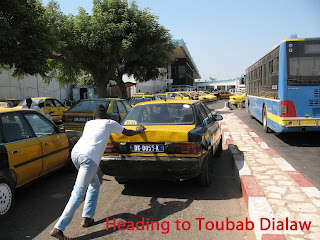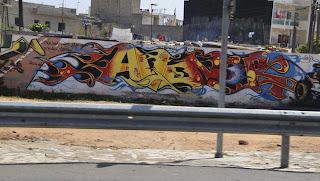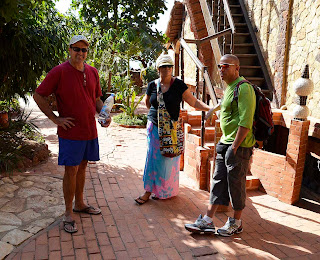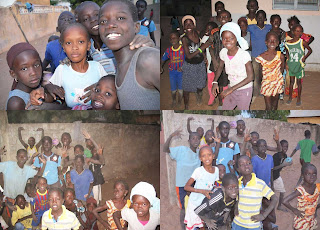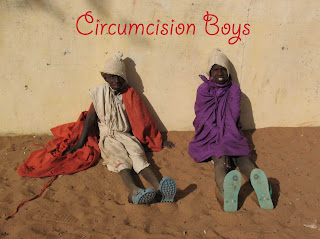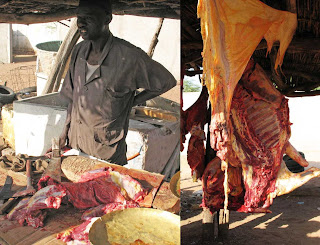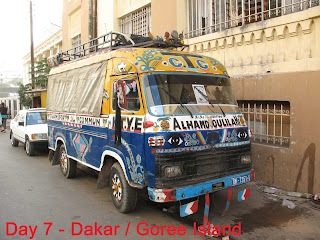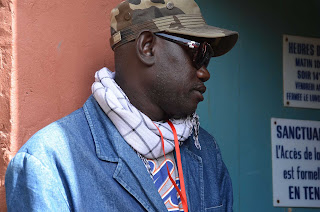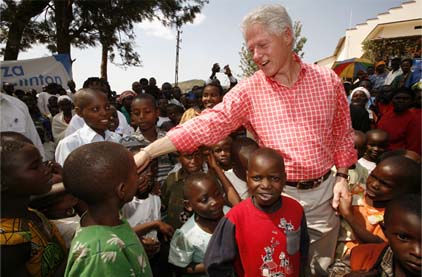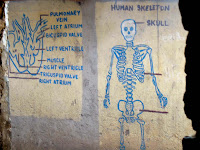*All Pictures at the bottom of Post
After meeting up with Margarite in Washington D.C. (Margarite never told me why she was in D.C.) we boarded a plane to Senegal. This voyage back to Botswana for the last time, includes an extended stay exploring a few places in Senegal. Our direct flight from Washington Dulles Airport to Dakar was 7 hours of ease and comfort in a cramped airplane seat.
 We landed in Dakar right on time at 6:35 AM. We would latter find out this would be the last time something would be on time in Senegal. The plan was to meet Mariama at the Airport around 9:35 AM. Mariama's parents Money and Ndeye-Anta would be joining us, and their flight from New York was scheduled to arrive at 9:35 AM. Customs and immigrations was a non-event except for one situation. On the immigration form it asked, "Where you are staying while in Senegal?" Both Margarite and I left this question blank as Mariama had made all our travel plans.
We landed in Dakar right on time at 6:35 AM. We would latter find out this would be the last time something would be on time in Senegal. The plan was to meet Mariama at the Airport around 9:35 AM. Mariama's parents Money and Ndeye-Anta would be joining us, and their flight from New York was scheduled to arrive at 9:35 AM. Customs and immigrations was a non-event except for one situation. On the immigration form it asked, "Where you are staying while in Senegal?" Both Margarite and I left this question blank as Mariama had made all our travel plans.
After meeting up with Margarite in Washington D.C. (Margarite never told me why she was in D.C.) we boarded a plane to Senegal. This voyage back to Botswana for the last time, includes an extended stay exploring a few places in Senegal. Our direct flight from Washington Dulles Airport to Dakar was 7 hours of ease and comfort in a cramped airplane seat.
 We landed in Dakar right on time at 6:35 AM. We would latter find out this would be the last time something would be on time in Senegal. The plan was to meet Mariama at the Airport around 9:35 AM. Mariama's parents Money and Ndeye-Anta would be joining us, and their flight from New York was scheduled to arrive at 9:35 AM. Customs and immigrations was a non-event except for one situation. On the immigration form it asked, "Where you are staying while in Senegal?" Both Margarite and I left this question blank as Mariama had made all our travel plans.
We landed in Dakar right on time at 6:35 AM. We would latter find out this would be the last time something would be on time in Senegal. The plan was to meet Mariama at the Airport around 9:35 AM. Mariama's parents Money and Ndeye-Anta would be joining us, and their flight from New York was scheduled to arrive at 9:35 AM. Customs and immigrations was a non-event except for one situation. On the immigration form it asked, "Where you are staying while in Senegal?" Both Margarite and I left this question blank as Mariama had made all our travel plans. Apparently in Senegal where you are staying a very important question. We were asked to go into a small room, a room similar to an interrogation room you may have seen on a police TV show, one way mirror and everything. The one big difference was the one way mirror, it was of poor quality, we could make out the silhouettes of the two people watching us from the other side of the mirror.
The immigration officers had lots of questions for us, most of them where about our past travels and why we have visited so many countries, but the main theme kept coming back to how we could fly all they way to Senegal without knowing where we were staying. For some reason Mariama told us no matter what, "Do not tell anybody we are meeting her!", in fact she told us not to mention her name at all.
After about an hour of the same questions over and over again we were unexpectedly release and told to go on our way. We still had two hours before we were to meet Mariama so we thought we would kill sometime and find a place to buy a SIM card for our phone.
A very nice gentlemen offered to help. As I have mentioned before I speak all languages, in Senegal the national language is French, in local villages they speak their native language of Wolof or Pulaar. My French was a little rusty, but I could understand what was going on. The gentleman told a few friend he had a fish on the line (that would be me). I knew a SIM card would be at most 5,000 Francs about $10.00. We now had about 6 Senegalese men escorting us (the fish) through the airport, finally one guy showed up with the SIM card. They installed it in our phone and showed me it worked by calling my phone. I paid them 5,000 Francs even though they wanted 20,000 Francs. Margarite and I then went in the airport restaurant figuring the crowd of men would not follow us. We were wrong, they kept telling us how poor they were and what a poor country Senegal was.
A man in the Restaurant finally chased them away. Our new friend Lady, yes his name was Lady, allowed us to lay down and rest in his restaurant. Around 9:00 AM I tried to call Mariama and found out my phone could not dial out it could only receive calls. Our original friends got the last laugh. They sold me (the fish) a SIM card with no credits. Lady hooked me up and got some credits put on our phone.
Lady also told us the 9:35 AM flight would land sometime between 10:00 AM and 12:00 PM. We finally got a hold of Mariama and we waited, and waited, and waited, at 12:35 PM the plane landed.
Guess what Mariama's parents had no idea where they were staying! All of a sudden Money came running out yelling for Mariama to tell him where they were staying, once Mariama yelled back, Money ran inside just as quickly. He returned about an hour later. Money and Ndeye-Anta did not get interrogated as we had, but they were told they had to wait and be the last ones through customs. The moral of the story, if you go to Senegal know where you are staying.
Mariama had arranged two cabs to drive us the 80 kilometers to a small fishing village south of Dakar on the Atlantic Ocean the name of the village is Toubab Dialaw. The drive was very exciting, one cab driver had to push start the other cab as there was no battery to start the car. The two cabs raced the entire ride, usually attempting to pass on the roundabouts. The road was high quality, but none of the vehicles were. The vehicles on the road ranged from donkeys, to bush busses. After numerous wrong turns we arrived in the fishing village of Toubab Dialaw and the hotel Sobo Bode an Art Hotel. This hotel is a sister hotel to the Sagamore Hotel I stay at in South Beach which is also an Art Hotel.
Once at the hotel we got settled had a late lunch and caught up, also we met a co-worker of Mariama's named Jenn and her parents Dave and Sandra. Not sure of their story as Dave has a Scottish accent , Sandra an English accent, and Jenn was clearly American.
Day 2 - Village of Toubab Dialaw
Margarite and I went for an early morning run, we were staying right on the beach, while our hotel was very nice, this was not a resort town, it was a fishing village, as we ran through town it was clear the locals were not use to two tobobs (name for white people in Senegal) running down the main road of town, everybody greeted us and made us feel welcome. This area was poor, but by no means in poverty.
After our run and a three hour breakfast, not by choice, but quick restaurant service is an unknown in Senegal. We took a long walk through town, we walked mostly back streets, popping on to the main road every so often just to get our bearings. It was Christmas Eve. With Senegalese being mostly Muslim there were only a few signs of Christmas which was pleasant after being inundated with the commercialism of Christmas in the United States.
Once we got to the edge of town, about 2 miles from our hotel we left the main road and headed toward the beach, we walked the beach back to our hotel. While Toubab Dialaw is a fishing village interspersed on the beach are magnificent beach homes. I am sure these are owned by folks that live in Dakar or even Europe as second homes.
After our walk we meet up with the rest of the group and had a nice ocean swim. Our afternoon of relaxing and catching up was highlighted with hearing about Jenn and Mariama's work in Senegal. I wish I could tell you about their work, but they told me if I told anybody, they would have to kill me.
We had a four hour dinner at a nice restaurant across the alley from our hotel, the name was simple and easy to remember, "Restaurant". After dinner we were invited to a dance show at our hotel. These dancers were some of the best athletes I had ever seen, they danced for two hours straight some of the dancing included very involved gymnastic moves. The show was like Cirque du Soleil on steroids.
Video of the show
After the show it was cocktails out by the beach until midnight so we could wish everybody a Merry Christmas then off to bed.
Day 3 Christmas Day 2012
We had a nice early morning run before hanging out at the hotel. The weather is a little hotter so I found some shade and caught up on some reading. The plan for today is have an early Christmas day lunch / dinner on the beach. At 3:30 we met at the beach for an awesome lunch / dinner, fresh fish, chicken, vegetables.
Dinner lasted several hours, which seems to be the Senegal way. Tomorrow we head to Mariama's village. We said our good byes to Jenn's family and hit the sack.
Day 3 Ride to Mariama's Village
We met at 8:00 AM for our seven hour drive from Toubab Dialaw to the village of Mbeuleukhe. Mariama had arranged a septplace (seven passenger car), Mariama told us our septplace was a very good one. If ours was good, I would hate to see a bad one. The first 2 to 3 hours of the ride were on very good roads especially for African standards. At some point the road turned more to what I have experienced in Africa, a road full of pot holds, where the ride off to the side of the road (un-paved) is smoother than the paved road.
Once we reached the Village of Dahra which is the last village before Mariama's village of Mbeuleukhe, we stopped for a nice lunch of rice and fish. Lunch was very good and the service very fast, which was the exception of what we have experienced so far in Senegal.
Mbeuleukhe was now only 40 kilometers away via bumpy dirt road, and bumpy it was, if our septplace was nice when we started it was not nice now. As we crested our last hill we could see two towers of the Masque and the water tower the first signs of the village, both or which are right next to Mariama's compound. We would later find out this would come in handy when walking around the village and wanting to get back to the compound.
Once in the village we meet Mariama's Senegalese family, a very welcoming family, they made us feel like their home was our home.
Once we visited with Mariama's family and moved into our rooms we went and met with the religious leaders. We were tired from our drive so we had lazy afternoon in the compound with many of the village elders stopping by to visit. While Mbeuleukhe was larger than my village it was not nearly as advanced with one exception, they did have current (electricity), run via wire from a power plant miles away. While my village generated our own limited power from our windmill.
As far as sanitation, they dumped there trash at the edge of the village where the animals eat what they can. What remains, plastic products, blows throughout the village. Yes, trash mostly plastic everywhere. Each compound has it's own bathrooms, most were just drop toilets with no composting. Some dump out on the paths like our village before we put in the compost toilets. Mbeuleukhe has running water which was supplied by the water tower. While we had a water pump driven by our windmill, if I was going to remain at my village I would purpose putting in a water tower it makes a lot of sense to provide consistent water pressure.
One thing that was familiar to me is how much village kids love to have their pictures taken and even more how they love to view the picture once taken. I have experienced this in every African village I have been in, no matter the country. I think a big reason for this is most villages do not have mirrors so for some of these kids it is the only time they get to see themselves.
Dinner was a macaroni and goat meat dinner. We all ate out off one plate I used a spoon but most used their hands.
Day 4 Tour the Village of Mbeuleukhe.
We work up at 6:30 AM to the morning pray coming from the Masque, no matter how often I hear the call to pray, I always enjoy the beautiful mellow sound. Margarite and I went for a running tour of the village, besides the rosters not many villagers were awake at this time. The sun was just coming up over the horizon a bright red glow, a sight I have seen hundreds, if not thousands of time, but a sight I will never tire of, the African sunrise.
Once back at the compound we found Mariama, Ndeye-Anta, and Money awake and ready to tour. Mariama is going to show us around an introduce us to many of her family. The village is made up of the Wolof tribe and the Pulaar tribe, Mariama's family is a member of the Wolof tribe in fact her grandfather is the mayor or Chief of the tribe.
We first stopped at the sandwich place where we had onion, bean, and mustard sandwiches. Two sandwiches feed 5 people for a total cost of 50 cents U.S., prices seem to be equivalent to prices in my village. After breakfast we visited the local medical clinic, this was of great interest to me. We do not have a clinic in my village. For such a small village the clinic was rather large, it even had an ambulance, though the ambulance may have just been for show I am not sure it operated. The birthing room was rather plan and unsophisticated, the incubator for premature babies was a rack with incandescent light builds to heat the babies.
We did see two boys that recently had their circumcision, the tradition in the village is the circumcision is a public celebration, after which the boy have to wear a funny hate that looks like a dunce cap. They can not bath or speak to anyone for 11 days. Since they can not bath they must get their wound cleaned at the medical clinic. We lucked out and got to see this. The boys looked about 13 years of age.
As we continued our tour we meet the butcher as well as other craftsmen. Mariama introduced us to many people far to many to mention.
We returned about 2:00 PM for lunch. This village is far more conservative than my village the men and women eat separately. We had a large bowl of rice and fish, very delicious. The men ate with spoons and the women used their hands.
After lunch we relaxed until 4:45 PM Mariama had arranged for us to take a tour of the high school. Having a high school in the small village is unheard of. The high school was a recent addition to the village and no one could explain why it was there or how it got funded. Children come from hundreds of miles away to attend this school. It was a very beautiful school.
After the tour we had dinner of rice and dried fish tomorrow we head to the big city so it was off to bed. Around 2:00 AM we heard a high pitch scream, it sound as if it came from a child. My first thought was the tribe was having a human child sacrifice. Shortly after the scream I heard adults yelling, quickly the compound was quiet again.
Day 5 Drive to Dakar
We had a septplace pick us up at 7:00 AM. This one not as nice as the last one but for Septplace standards it was still a very nice. We stopped in Dahra for breakfast. We went to the omelet sandwich shop, what an awesome breakfast, we had a very greasy, oily, onion egg omelet on a hoagie roll. This sandwich put White House Hoagies to shame and the cost, about 20 cents a sandwich.
After breakfast we were back on the road a very bumpy road we had 7 to 9 hours of driving ahead of us depending on traffic and road conditions. As we continued our drive the day was getting hotter and hotter the septplace was like an oven and we were like baking beef. We all noticed the steering wheel had a vibration that was getting worse and worse as the drive continued.
Some vibration of a steering wheel would not be a surprise with the roads as bumpy as they are, but this was much more severe than expected. Finally as we approached a small village the driver pulled over to have a look, the timing could not have been better as we all needed to use the bathroom (douche / toilette). In Senegal it is common to allow stranger use your home bathroom or should I say hole in the ground. We found a compound said, "douche" and were welcomed in. As we returned to the car we saw the driver pulling the rear axle and replacing it with a spare he had on the roof rack. Once everything was back together we were on the road again. The steering wheel vibration was as severe as ever, but the drive seemed more relaxed with the new axle installed. We made it to Dakar in one piece, traffic was very heavy the last 10 kilometers.
Mariama had reserved us rooms at Hotel Firhad, a very nice middle of the road hotel in a great location. We had dinner at the Lebanese Restaurant across the street from the hotel and owned by the hotel. What a great meal at a perfect time in the trip after a few days of rice and fish eating in a common bowl with spoons and hands. It is clear we are back in a city the dinner was about $20 per person vs. cents per person in the village.
After dinner it was hot showers our first hot showers in Senegal, also I got ride of my camper belly, yes it had been 5 days since I pooped. Every since we installed our compost toilets I have a hard time pooing in a hole.
Day 6 - Goree Island
I had planned to get up and run, but my brain and body had other plans I slept in until 8:00 AM then met everybody at the hotel Restaurant for breakfast. Mariama's uncle Mas was suppose to join us and give us a tour of Goree Island. He forgot he gets seasick so he arranged a tour guide for us.
After breakfast we walked to the ferry dock, like I said the hotel was in a great location. We met our guide whose name was Gino. He only spoke Wolof so Mariama had to translate. The ferry ride was 20 minutes. The only negative of the island is they charge for each little exhibit it is not expensive at all, but just a pain. Goree Island is where much of the slave trade between Africa and the Americas took place. The way the slaves were treated was horrific. I read "Roots" right before this trip and I am glad I did as it tied a lot of the story together. The island is now a small village with 1,200 full time residents 800 are muslin and 400 Christian.
We toured the Slave House Museum which is where the slaves were kept right until they boarded the ships to America. There was a door that had a wooden pier built off it. The boats would pull up the pier and load slaves. They called this door, "The Door of No Return", once a slave crossed through the doorway they either went on the boat for a one way trip to America or jumped in the ocean for a one way trip into a sharks belly.
After the museums we toured the different artist galleries and had a very nice lunch of very fresh fish and chips. The afternoon was buying some art and tour the rest of the island before the ferry ride back. I highly recommend Goree Island.
Once back in Dakar Mariama, Margarite, and I went to the market to look at fabrics, Senegal is known for its beautiful and vibrant fabrics the colors and patterns are second to none. We found a great shop and set an appointment for the next day. Money and Ndeye-Anta went back to the hotel to rest.
We meet a friend of Mariama's, Andrew and his parents for drinks, Andrew was departing the next day for a sail around the world on a 12 foot sail boat, yes 12 foot. Andrew was very confident, though his parents seemed a little concerned.
We left Andrew's family and headed over to the French Culture Center to try out a recommend restaurant called Bideew. We had a great inexpensive meal.
Day 7 the Dakar Markets
I went for a easy 5 mile run, I found a road that runs along the cliff lined coast of Dakar, the ocean on one side and beautiful houses on the other. After breakfast Margarite and I walked the city until 11:00 AM when we meet up with Mariama, Ndeye-Anta, and Money we all walked to the market, first on the list was fabrics. Margarite found some beautiful Senegal fabrics for just a song. The shop keeper even took us to see a Senegalese sweat shop to see the children making hand bags, they actually had them locked in cells with their sewing machines.
From there we visited other markets where Money and Ndeye-Anta did a lot of consuming, now I know why they call Money, "MONEY" he spent plenty of it. One shop keeper gave me a gift just for bringing Money in his shop.
We had a great lunch of sandwiches at the Viking Bar before spending the rest of the day walking the streets of Dakar hitting some of the less touristy areas really getting to see what life is like in Dakar.
We decided dinner would be at an Ethiopian Restaurant called Lalibela, all 5 of us piled into one cab. We got to eat with our hands again I felt like we were back in Mbeuleukhe, everybody eating off the same plate with no napkins.
After dinner we meet up with Mariama's uncle Mas at the Independent Square for a quick introduction and chat. It was now approaching 10:00 PM Money and Ndeye-Anta had a 2:00 am flight back to the states so we started the 3 block walk back to our hotel.
 In the past 7 years I have traveled extensively, visiting over 30 countries some in areas one my consider dangerous. I have never had an incident where I felt threatened personally or any of my possessions were at risk (money, electronics, identification, etc) especially in a predominantly Muslim country (My experience has been that African Muslims are very gentle and honest people) that was all about to change.
In the past 7 years I have traveled extensively, visiting over 30 countries some in areas one my consider dangerous. I have never had an incident where I felt threatened personally or any of my possessions were at risk (money, electronics, identification, etc) especially in a predominantly Muslim country (My experience has been that African Muslims are very gentle and honest people) that was all about to change.
An attempted pick pocketing that turned into a mugging.
 As we walked back to the hotel we were on a crowded main street. As we continued up the street our group got spread out (girls a few feet ahead of the guys) MISTAKE ONE. This section of the street got very dark where as the other side of the street had better lighting, we should of crossed over MISTAKE TWO. As Money and I entered the dark section three men started grabbing at our pants / front pockets. It was clear they were trying to distract us to pick our pockets. Money had nothing in his pockets so he was fine. All my pockets were zipped shut so I was fine, or so I thought. As one of the guys pulled hard on my shorts (right side) I punched his arm to get him to release, which he did. At the same time one of the other guys reached into my upper left shirt pocket and took my camera. The girls heard the commotion and turned. Margarite realized there was a fourth guy who had opened my unlocked back pack MISTAKE 3. As she said something to me, I turned quickly enough that the guy did not see my fist hit his head. I quickly put him in a sleeper hold, as he was grasping for air I told him he was going to die unless the camera was returned and anything he took from my back pack was returned.
As we walked back to the hotel we were on a crowded main street. As we continued up the street our group got spread out (girls a few feet ahead of the guys) MISTAKE ONE. This section of the street got very dark where as the other side of the street had better lighting, we should of crossed over MISTAKE TWO. As Money and I entered the dark section three men started grabbing at our pants / front pockets. It was clear they were trying to distract us to pick our pockets. Money had nothing in his pockets so he was fine. All my pockets were zipped shut so I was fine, or so I thought. As one of the guys pulled hard on my shorts (right side) I punched his arm to get him to release, which he did. At the same time one of the other guys reached into my upper left shirt pocket and took my camera. The girls heard the commotion and turned. Margarite realized there was a fourth guy who had opened my unlocked back pack MISTAKE 3. As she said something to me, I turned quickly enough that the guy did not see my fist hit his head. I quickly put him in a sleeper hold, as he was grasping for air I told him he was going to die unless the camera was returned and anything he took from my back pack was returned.
Adrenalin is a wonderful thing. Simultaneously I heard a very loud whistle like a police whistle. I have no idea if the guy understood English, I had scared his buddies, or if the police whistle scared them, but my camera and a few things taken from my back pack were quickly returned.
I was almost pick pocketed, but instead four pick pockets were mugged, I later found out that Ndeye-Anta was the one that whistled and she did it without a whistle.
We all went to the hotel bar for a beer to relax. After the beer I noticed I had a huge knot just below my knee cap. It looked as if someone had put a golf ball under my skin just below my knee. About 30 minutes of ice, all was good, I must of hit my knee on something during the scuffle.
Day 8 New Years Eve 2013
Money and Ndeye-Anta were now somewhere over the Atlantic. We had a nice breakfast with Mariama before seeing her off in a cab. She will be going to St Louie for New Years. Margarite and I will spend one more day in Dakar before taking an early morning flight to South Africa and then Botswana. What a crazy day, the traffic is the worst I have seen from a volume standpoint. It is far more orderly than Cairo or Istanbul, but bumper to bumper grid lock on every street. The cars parked on the sidewalk so walking takes up all your brain power, walking Dakar has become a very focused mental exercise.
We walked up to the fabric shops where Margarite bought some more fabrics. We ran out of cash so an ATM visit was in order, but we found it took 4 visits as the first three ATMs were out of funds. If you visit Senegal bring Cash, no one takes credit cards and finding an ATM with money is a tough task.
The rest of the day was spent resting and packing. Dinner was another great meal at the hotel Restaurant.
Sleep was hard to come by, it was New Years Eve and we learned in Dakar they start celebrating at about 2:00 pm and continue until 3:00 am. The main part of the celebration is lighting off anything that makes nose from basic firecrackers to very elaborate fireworks that light up the entire Dakar sky. Some so loud I would swear some one lit a stick of dynamite. For 13 hours with maybe at most a 10 minute break there was bang after bang. Talk about shock and awe, now I know what it is like to be in a war zone. Our 5:00 am wake up call came after just 2 hours of sleep.
Good Bye Dakar, the only city I have ever visited that I think I might refuse to come back to. It was not because of the pickpocket, there was just no redeeming quality about the city. For now I am off to my village in Botswana.
Cheers,
DUG



